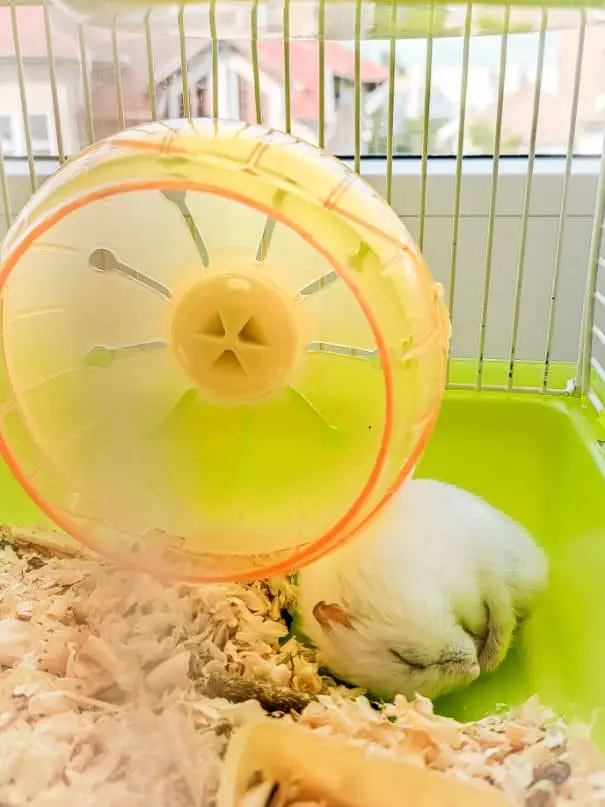I often get asked why hamsters sleep so much. Although it may seem like your furry friend is snoozing all day and night, there are actually several factors that affect their sleep patterns.
In this blog post, we will explore the different stages of hamster sleep, the factors that affect their sleep, when to be concerned about your hamster’s sleep, and how to help your hamster sleep better.

Hamsters and Their Natural Sleep Patterns
Hamsters are nocturnal/crepuscular animals, which means they are most active during the night and sleep during the day. However, this doesn’t mean that they sleep for the entire day. Let’s take a look at some common questions about hamster sleep:
How Much Sleep Do Hamsters Need?
Hamsters typically need around 10 to 14 hours of sleep a day, but this can vary depending on the type of hamster and their age. Younger hamsters may require more sleep, while older hamsters may need less.
What Are The Different Stages of Hamster Sleep?
Like humans, hamsters go through different stages of sleep. The two main stages are REM (rapid eye movement) sleep and non-REM sleep. During non-REM sleep, your hamster’s body is relaxed and they are less likely to move around. During REM sleep, their eyes may move rapidly and they may twitch or make noises.
Do Hamsters Sleep More During Certain Times of the Day?
As mentioned earlier, hamsters are most active during the night and sleep during the day. However, they may take short naps throughout the night as well. It’s important to create a quiet and dark environment for your hamster during the day so they can get the rest they need.
Factors That Affect Hamster Sleep
There are several factors that can affect your hamster’s sleep patterns. Let’s take a closer look at some of them:
Ambient Light and Temperature
Hamsters are sensitive to light and temperature, so it’s important to create a good sleeping environment for them. Make sure their cage is in a quiet and dark area, and keep the temperature between 60-70 degrees Fahrenheit.
Diet and Exercise
A poor diet and lack of exercise can also affect your hamster’s sleep. Make sure they are getting a balanced diet and have plenty of opportunities to exercise in their cage.
The Type of Hamster You Have
Different types of hamsters have different sleep patterns. For example, Syrian hamsters are more likely to be active during the day and sleep at night, while dwarf hamsters are more likely to be active at night and sleep during the day.
When to Be Concerned About Your Hamster’s Sleep
While it’s normal for hamsters to sleep a lot, there are some signs that may indicate a problem. Let’s take a look at some of them:
Signs of Illness or Injury
If your hamster is sleeping more than usual and also showing other signs of illness or injury, such as decreased appetite or lethargy, it’s important to take them to the vet.
Changes in Your Hamster’s Sleeping Habits
If your hamster’s sleeping habits suddenly change, such as sleeping more than usual or not sleeping at all, it may be a sign of an underlying problem.
What to Do If You Suspect Your Hamster Is Sleeping Too Much
If you suspect your hamster is sleeping too much, it’s important to observe their behavior and take note of any other symptoms they may be showing. If you are concerned, take them to the vet for a check-up.
How to Help Your Hamster Sleep Better
There are several things you can do to help your hamster sleep better. Let’s take a look at some of them:
Creating a Good Sleeping Environment
As mentioned earlier, it’s important to create a quiet and dark environment for your hamster during the day. Make sure their cage is in a cool, dark place and provide them with a comfortable sleeping area.
The Importance of Routine and Consistency
Hamsters thrive on routine and consistency, so it’s important to establish a regular feeding and sleeping schedule for them.
What You Can Do If Your Hamster Is Waking Up Too Early or Late
If your hamster is waking up too early or late, try adjusting their feeding and sleeping schedule. You can also try providing them with more toys and activities to keep them occupied during the night.
Conclusion
In conclusion, hamsters sleep a lot because it’s natural for them to do so. They need a lot of sleep in order to be healthy. However, there are several factors that can affect their sleep patterns. By creating a good sleeping environment and establishing a regular routine, you can help your hamster get the rest they need.
If you are concerned about your hamster’s sleep, don’t hesitate to take them to the vet for a check-up. Remember, a well-rested hamster is a happy hamster!
- How Long Do American Eskimo Dogs Live? Important Factors and Care Tips - September 29, 2023
- Do American Bulldogs Need Grooming? Essential Tips and Care Guidelines - September 29, 2023
- Do Bengal Cats Enjoy Playing? Essential Tips for Keeping Them Active - September 29, 2023